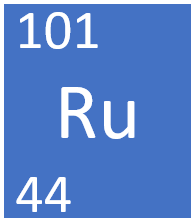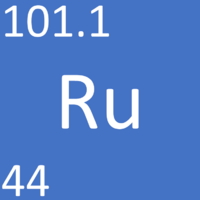Difference between revisions of "Ruthenium"
(Created page with "==Key Stage 2== ===Meaning=== Ruthenium is a metal. ==Key Stage 3== ===Meaning=== right|300px|thumb|The [[Chemical Symbol|chemical symbol...") |
|||
| (4 intermediate revisions by the same user not shown) | |||
| Line 4: | Line 4: | ||
==Key Stage 3== | ==Key Stage 3== | ||
===Meaning=== | ===Meaning=== | ||
| − | [[File: | + | [[File:RutheniumSymbol1.png|right|300px|thumb|The [[Chemical Symbol|chemical symbol]] for [[Ruthenium]].]] |
[[Ruthenium]] is a [[Transition Metal|transition metal]] [[element]], on the [[Periodic Table]], with an [[Atomic Number|atomic number]] of 44. | [[Ruthenium]] is a [[Transition Metal|transition metal]] [[element]], on the [[Periodic Table]], with an [[Atomic Number|atomic number]] of 44. | ||
===About Ruthenium=== | ===About Ruthenium=== | ||
====Molecular Structure==== | ====Molecular Structure==== | ||
| − | : [[Ruthenium]] has the [[Chemical Symbol|chemical symbol]] [[Ruthenium| | + | : [[Ruthenium]] has the [[Chemical Symbol|chemical symbol]] [[Ruthenium|Ru]]. |
: [[Ruthenium]] [[atom]]s join together in large numbers to form a giant [[metal]] [[molecule]]. | : [[Ruthenium]] [[atom]]s join together in large numbers to form a giant [[metal]] [[molecule]]. | ||
====Atomic Structure==== | ====Atomic Structure==== | ||
: [[Ruthenium]] as 44 [[proton]]s and 57 [[neutron]]s in its [[Atomic Nucleus|nucleus]] giving it an [[Atomic Number]] of 44 and an [[Relative Atomic Mass|atomic mass]] of 101. | : [[Ruthenium]] as 44 [[proton]]s and 57 [[neutron]]s in its [[Atomic Nucleus|nucleus]] giving it an [[Atomic Number]] of 44 and an [[Relative Atomic Mass|atomic mass]] of 101. | ||
| − | : [[Ruthenium]] is in [[Period]] | + | : [[Ruthenium]] is in [[Period]] 5 of the [[Periodic Table]] because it has 5 [[Electron Orbital|electron shells]]. |
====Properties==== | ====Properties==== | ||
: [[Ruthenium]] is a [[metal]] [[element]] so it is a good [[Thermal Conductor|thermal conductor]] and a good [[Electrical Conductor|electrical conductor]]. | : [[Ruthenium]] is a [[metal]] [[element]] so it is a good [[Thermal Conductor|thermal conductor]] and a good [[Electrical Conductor|electrical conductor]]. | ||
| Line 21: | Line 21: | ||
: [[Ruthenium]] is [[ductile]]. | : [[Ruthenium]] is [[ductile]]. | ||
==Key Stage 4== | ==Key Stage 4== | ||
| + | [[File:RuKS4.PNG|right|200px|thumb|The [[Chemical Symbol|chemical symbol]] for [[Ruthenium]].]] | ||
===Meaning=== | ===Meaning=== | ||
[[Ruthenium]] is a [[Transition Metal|transition metal]] [[element]], on the [[Periodic Table]], with 44 [[proton]]s in the [[Atomic Nucleus|nucleus]]. | [[Ruthenium]] is a [[Transition Metal|transition metal]] [[element]], on the [[Periodic Table]], with 44 [[proton]]s in the [[Atomic Nucleus|nucleus]]. | ||
| − | ===About | + | ===About Ruthenium=== |
====Molecular Structure==== | ====Molecular Structure==== | ||
| − | : [[Ruthenium]] has the [[Chemical Formula|chemical formula]] [[Ruthenium | | + | : [[Ruthenium]] has the [[Chemical Formula|chemical formula]] [[Ruthenium |Ru]]. |
: [[Ruthenium]] [[atom]]s join together in a [[Giant Metallic Structure|giant metallic structure]]. | : [[Ruthenium]] [[atom]]s join together in a [[Giant Metallic Structure|giant metallic structure]]. | ||
====Atomic Structure==== | ====Atomic Structure==== | ||
: The most [[Stable Isotope|stable isotope]] of [[Ruthenium]] has 57 [[neutron]]s in its [[Atomic Nucleus|nucleus]] giving it an [[Relative Atomic Mass|atomic mass]] of 101. | : The most [[Stable Isotope|stable isotope]] of [[Ruthenium]] has 57 [[neutron]]s in its [[Atomic Nucleus|nucleus]] giving it an [[Relative Atomic Mass|atomic mass]] of 101. | ||
| − | : [[Ruthenium]] is in [[Period]] | + | : [[Ruthenium]] is in [[Period]] 5 of the [[Periodic Table]] because it has 5 [[Electron Orbital|electron shells]]. |
: [[Ruthenium]] loses [[electron]]s to form [[Positive Charge|positive]] [[Metal Ion|metal ions]]. | : [[Ruthenium]] loses [[electron]]s to form [[Positive Charge|positive]] [[Metal Ion|metal ions]]. | ||
====Properties==== | ====Properties==== | ||
Latest revision as of 11:24, 5 March 2020
Contents
Key Stage 2
Meaning
Key Stage 3
Meaning
Ruthenium is a transition metal element, on the Periodic Table, with an atomic number of 44.
About Ruthenium
Molecular Structure
- Ruthenium has the chemical symbol Ru.
- Ruthenium atoms join together in large numbers to form a giant metal molecule.
Atomic Structure
- Ruthenium as 44 protons and 57 neutrons in its nucleus giving it an Atomic Number of 44 and an atomic mass of 101.
- Ruthenium is in Period 5 of the Periodic Table because it has 5 electron shells.
Properties
- Ruthenium is a metal element so it is a good thermal conductor and a good electrical conductor.
- Ruthenium is a shiny solid at room temperature.
- Ruthenium is malleable.
- Ruthenium is sonorous.
- Ruthenium is ductile.
Key Stage 4
Meaning
Ruthenium is a transition metal element, on the Periodic Table, with 44 protons in the nucleus.
About Ruthenium
Molecular Structure
- Ruthenium has the chemical formula Ru.
- Ruthenium atoms join together in a giant metallic structure.
Atomic Structure
- The most stable isotope of Ruthenium has 57 neutrons in its nucleus giving it an atomic mass of 101.
- Ruthenium is in Period 5 of the Periodic Table because it has 5 electron shells.
- Ruthenium loses electrons to form positive metal ions.
Properties
- Ruthenium forms ionic bonds with non-metals.
- Ruthenium is a metal element so it is a good thermal conductor and a good electrical conductor.
- Ruthenium is a shiny solid at standard temperature and pressure and has a high melting point.
- Ruthenium is malleable.
- Ruthenium is sonorous.
- Ruthenium is ductile.

